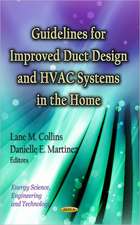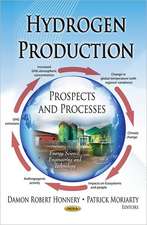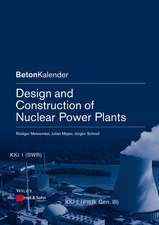Energy from Nuclear Fission: An Introduction: Undergraduate Lecture Notes in Physics
Autor Enzo De Sanctis, Stefano Monti, Marco Ripanien Limba Engleză Hardback – 28 iun 2016
The text is divided into two parts; the first covers the basics of nuclear forces and properties of nuclei, nuclear collisions, nuclear stability, radioactivity, and provides a detailed discussion of nuclear fission and relevant topics in its application to energy production. The second part covers the basic technical aspects of nuclear fission reactors, nuclear fuel cycle and resources, safety, safeguards, and radioactive waste management. The book also contains a discussion of the biological effects of nuclear radiation and of radiation protection, and a summary of the ten most relevant nuclear accidents. The book is suitable for undergraduates in physics, nuclear engineering and other science subjects. However, the mathematics is kept at a level that can be easily followed by wider circles of readers. The addition of solved problems, strategically placed throughout the text, and the collections of problems at the end of the chapters allow readers to appreciate the quantitative aspects of various phenomena and processes. Many illustrations and graphs effectively supplement the text and help visualising specific points.
| Toate formatele și edițiile | Preț | Express |
|---|---|---|
| Paperback (1) | 400.18 lei 6-8 săpt. | |
| Springer International Publishing – 31 mai 2018 | 400.18 lei 6-8 săpt. | |
| Hardback (1) | 874.52 lei 38-44 zile | |
| Springer International Publishing – 28 iun 2016 | 874.52 lei 38-44 zile |
Din seria Undergraduate Lecture Notes in Physics
- 17%
 Preț: 362.12 lei
Preț: 362.12 lei -
 Preț: 398.46 lei
Preț: 398.46 lei -
 Preț: 265.31 lei
Preț: 265.31 lei - 15%
 Preț: 478.05 lei
Preț: 478.05 lei -
 Preț: 371.85 lei
Preț: 371.85 lei - 17%
 Preț: 364.52 lei
Preț: 364.52 lei - 15%
 Preț: 620.25 lei
Preț: 620.25 lei - 17%
 Preț: 363.03 lei
Preț: 363.03 lei - 17%
 Preț: 427.77 lei
Preț: 427.77 lei -
 Preț: 493.12 lei
Preț: 493.12 lei - 18%
 Preț: 789.98 lei
Preț: 789.98 lei -
 Preț: 385.12 lei
Preț: 385.12 lei -
 Preț: 398.13 lei
Preț: 398.13 lei -
 Preț: 401.26 lei
Preț: 401.26 lei - 13%
 Preț: 358.33 lei
Preț: 358.33 lei - 17%
 Preț: 429.08 lei
Preț: 429.08 lei - 17%
 Preț: 362.93 lei
Preț: 362.93 lei -
 Preț: 472.30 lei
Preț: 472.30 lei - 17%
 Preț: 363.48 lei
Preț: 363.48 lei -
 Preț: 338.98 lei
Preț: 338.98 lei - 17%
 Preț: 364.57 lei
Preț: 364.57 lei - 20%
 Preț: 579.78 lei
Preț: 579.78 lei - 17%
 Preț: 365.69 lei
Preț: 365.69 lei - 17%
 Preț: 366.62 lei
Preț: 366.62 lei - 17%
 Preț: 432.41 lei
Preț: 432.41 lei -
 Preț: 372.37 lei
Preț: 372.37 lei -
 Preț: 359.54 lei
Preț: 359.54 lei -
 Preț: 397.26 lei
Preț: 397.26 lei -
 Preț: 317.55 lei
Preț: 317.55 lei -
 Preț: 229.58 lei
Preț: 229.58 lei - 15%
 Preț: 538.28 lei
Preț: 538.28 lei -
 Preț: 468.02 lei
Preț: 468.02 lei -
 Preț: 428.07 lei
Preț: 428.07 lei -
 Preț: 637.07 lei
Preț: 637.07 lei -
 Preț: 582.65 lei
Preț: 582.65 lei -
 Preț: 424.77 lei
Preț: 424.77 lei -
 Preț: 446.96 lei
Preț: 446.96 lei - 15%
 Preț: 515.30 lei
Preț: 515.30 lei -
 Preț: 348.22 lei
Preț: 348.22 lei -
 Preț: 313.45 lei
Preț: 313.45 lei -
 Preț: 319.43 lei
Preț: 319.43 lei - 15%
 Preț: 509.58 lei
Preț: 509.58 lei - 15%
 Preț: 507.95 lei
Preț: 507.95 lei -
 Preț: 361.29 lei
Preț: 361.29 lei -
 Preț: 453.21 lei
Preț: 453.21 lei -
 Preț: 453.01 lei
Preț: 453.01 lei - 15%
 Preț: 722.67 lei
Preț: 722.67 lei -
 Preț: 392.21 lei
Preț: 392.21 lei -
 Preț: 383.71 lei
Preț: 383.71 lei
Preț: 874.52 lei
Nou
Puncte Express: 1312
Preț estimativ în valută:
167.36€ • 174.08$ • 138.17£
167.36€ • 174.08$ • 138.17£
Carte tipărită la comandă
Livrare economică 10-16 aprilie
Preluare comenzi: 021 569.72.76
Specificații
ISBN-13: 9783319306490
ISBN-10: 3319306499
Pagini: 150
Ilustrații: XV, 278 p. 55 illus.
Dimensiuni: 155 x 235 x 20 mm
Greutate: 6.22 kg
Ediția:1st ed. 2016
Editura: Springer International Publishing
Colecția Springer
Seria Undergraduate Lecture Notes in Physics
Locul publicării:Cham, Switzerland
ISBN-10: 3319306499
Pagini: 150
Ilustrații: XV, 278 p. 55 illus.
Dimensiuni: 155 x 235 x 20 mm
Greutate: 6.22 kg
Ediția:1st ed. 2016
Editura: Springer International Publishing
Colecția Springer
Seria Undergraduate Lecture Notes in Physics
Locul publicării:Cham, Switzerland
Cuprins
Part I. Nuclear Physics and Radioactivity.- 1. The Building Blocks of Matter.- 2. Radioactivity and Penetrating Power of Nuclear Radiation.- 3. Nuclear Reactions and Fission.- Part II. Nuclear Energy from Nuclear Fission.- 4. Nuclear Reactors.- 5. Nuclear Safety and Radiation Protection.- 6. Management of Radioactive Waste.- Glossary.
Recenzii
“In Energy from Nuclear Fission: An Introduction, authors Enzo De Sanctis, Stefano Monti, and Marco Ripani survey their subject in a novel manner. … What is striking about the book is the quality of the writing and the presentation of material. The graceful prose makes reading their book a pleasure. The sections are illustrated with graphs, pictures, and worked examples … . Energy from Nuclear Fission is a unique, rich, and valuable resource.” (Noel Corngold, Physics Today, Vol. 70 (3), March, 2017)
“A refreshing introduction in the physics of nuclear reactions and nuclear energy. … The intended readers of this book, whether they are undergraduates, scientists or simply the curious should find therein not just a very good source of information but also an excellent collection of clear explanations of all aspects of nuclear energy. … The book will be a welcome contribution to the libraries of all interested in a subject that has become controversial and misunderstood sincemany years.” (Jef Ongena, Europhysics News, Vol. 48 (1), 2017)
“The book provides a complete overview of the many aspects and issues involved in the deployment of nuclear power. … authoritative sources of information are given throughout the text to stimulate the reader to expand his/her knowledge … . the book can serve as a readable and reliable source of information for anyone who wants to have a well balanced opinion about exploitation of nuclear fission in power production.” (Gianluca Alimonti, Nuclear Physics News, Vol. 26 (4), 2016)“A refreshing introduction in the physics of nuclear reactions and nuclear energy. … The intended readers of this book, whether they are undergraduates, scientists or simply the curious should find therein not just a very good source of information but also an excellent collection of clear explanations of all aspects of nuclear energy. … The book will be a welcome contribution to the libraries of all interested in a subject that has become controversial and misunderstood sincemany years.” (Jef Ongena, Europhysics News, Vol. 48 (1), 2017)
Notă biografică
Enzo De Sanctis is Director of Research Emeritus at the Frascati Laboratory of INFN, Member of the Energy Group of the European Physical Society, and Associate-Editor of the Journals EPJ-Plus, Il Nuovo Cimento and Il Nuovo Saggiatore.
He served in a number of national and international scientific committees, among which: EPJ-A (Editor in Chief), Italian Physical Society (Vice President and Councilor); INFN Board of Directors; OECD Megascience Forum; Editorial Board of Physical Review C; CERN-NuPECC Working Group for the ELFE project (Director); Programme Advisory Committee of JLab; Council of Frascati Laboratory, INFN National Committee for Nuclear Physics.
He has been working on experimental nuclear and hadron physics for more than 45 years, leading research projects at the accelerators of Frascati, Saclay, Bonn, DESY (Hamburg) and Jlab (Newport News, VA, USA).
He has published more than 300 papers on refereed, international journals. He is also co-author of six physicsbooks for university students and he has co-edited ten proceedings of Conferences/Workshops.
Stefano Monti is the Scientific Secretary of the IAEA’s Technical Working Group on Fast Reactors (TWG-FR) and member of the Publication Committee. He received his degree in Nuclear Engineering at University of Bologna in 1982. He. For over 30 years he has been working on several national and international projects and programmes on advanced nuclear systems, leading a number of international research groups. As Director of Research at ENEA, he was Head of Nuclear Fission Division, President of SIET, and scientific coordinator of the R&D programme on nuclear fission.
He served in a number of national and international nuclear committees, among which: the INFN Board of Directors, the Steering Committee and the NDC Committee of the OECD-NEA, the IAEA TWG-FR, the Sustainable Nuclear Energy Technology Platform, the European Sustainable Nuclear Industrial Initiative and the European Energy Research Alliance (EERA) on Nuclear Materials.
He served in a number of national and international scientific committees, among which: EPJ-A (Editor in Chief), Italian Physical Society (Vice President and Councilor); INFN Board of Directors; OECD Megascience Forum; Editorial Board of Physical Review C; CERN-NuPECC Working Group for the ELFE project (Director); Programme Advisory Committee of JLab; Council of Frascati Laboratory, INFN National Committee for Nuclear Physics.
He has been working on experimental nuclear and hadron physics for more than 45 years, leading research projects at the accelerators of Frascati, Saclay, Bonn, DESY (Hamburg) and Jlab (Newport News, VA, USA).
He has published more than 300 papers on refereed, international journals. He is also co-author of six physicsbooks for university students and he has co-edited ten proceedings of Conferences/Workshops.
Stefano Monti is the Scientific Secretary of the IAEA’s Technical Working Group on Fast Reactors (TWG-FR) and member of the Publication Committee. He received his degree in Nuclear Engineering at University of Bologna in 1982. He. For over 30 years he has been working on several national and international projects and programmes on advanced nuclear systems, leading a number of international research groups. As Director of Research at ENEA, he was Head of Nuclear Fission Division, President of SIET, and scientific coordinator of the R&D programme on nuclear fission.
He served in a number of national and international nuclear committees, among which: the INFN Board of Directors, the Steering Committee and the NDC Committee of the OECD-NEA, the IAEA TWG-FR, the Sustainable Nuclear Energy Technology Platform, the European Sustainable Nuclear Industrial Initiative and the European Energy Research Alliance (EERA) on Nuclear Materials.
Marco Ripani is senior staff scientist at the Genova unit of INFN. He has been working on experimental nuclear and hadron physics for more than 20 years, participating to research projects at the accelerators of Frascati, NIKHEF, ESRF (Grenoble, France) and leading research projects at JLab (Newport News, VA, USA). He is currently leading the national INFN project on energy-related topics, within which he carries on research on subcritical reactors and neutron detectors.
He served in a number of national and international scientific committees, among which the Group of Experts for the Art. 37 of the Euratom Treaty on the disposal of radioactive waste.
He has been referee for grant applications to several research funding agencies worldwide.
He has published more than 200 papers on refereed international journals.
He served in a number of national and international scientific committees, among which the Group of Experts for the Art. 37 of the Euratom Treaty on the disposal of radioactive waste.
He has been referee for grant applications to several research funding agencies worldwide.
He has published more than 200 papers on refereed international journals.
Textul de pe ultima copertă
This book provides an overview on nuclear physics and energy production from nuclear fission. It serves as a readable and reliable source of information for anyone who wants to have a well-balanced opinion about exploitation of nuclear fission in power plants.
The text is divided into two parts; the first covers the basics of nuclear forces and properties of nuclei, nuclear collisions, nuclear stability, radioactivity, and provides a detailed discussion of nuclear fission and relevant topics in its application to energy production. The second part covers the basic technical aspects of nuclear fission reactors, nuclear fuel cycle and resources, safety, safeguards, and radioactive waste management. The book also contains a discussion of the biological effects of nuclear radiation and of radiation protection, and a summary of the ten most relevant nuclear accidents.
The book is suitable for undergraduates in physics, nuclear engineering and other science subjects. However, the mathematics is kept at a level that can be easily followed by wider circles of readers. The addition of solved problems, strategically placed throughout the text, and the collections of problems at the end of the chapters allow readers to appreciate the quantitative aspects of various phenomena and processes. Many illustrations and graphs effectively supplement the text and help visualising specific points.
Caracteristici
Provides the physics basis to lead the reader into a detailed presentation of nuclear fission and the relevant topics in nuclear energy Discusses nuclear energy issues of great scientific importance and also of great public interest Written in a clear and easy to follow style Offers many solved problems strategically placed throughout the text and also useful collections of problems at the end of the chapters Presents the technical/scientific aspects as well as the medical and policy aspects Written by a prominent expert in nuclear physics and an influencial nuclear engineer Includes supplementary material: sn.pub/extras
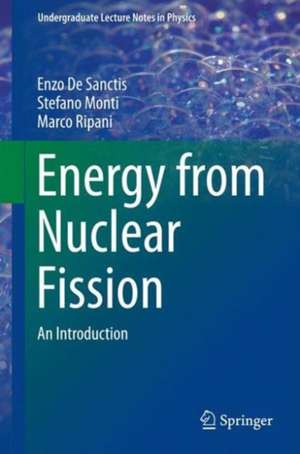
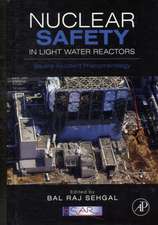
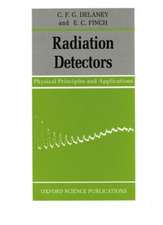
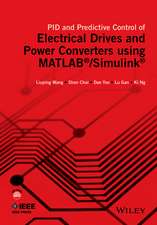

![Principles of GNSS, Inertial, and Multisensor Integrated Navigation Systems [With DVD]: Volume 2](https://i0.books-express.ro/bt/9781608070053/principles-of-gnss-inertial-and-multisensor-integrated-navigation-systems-with-dvd.jpg)

